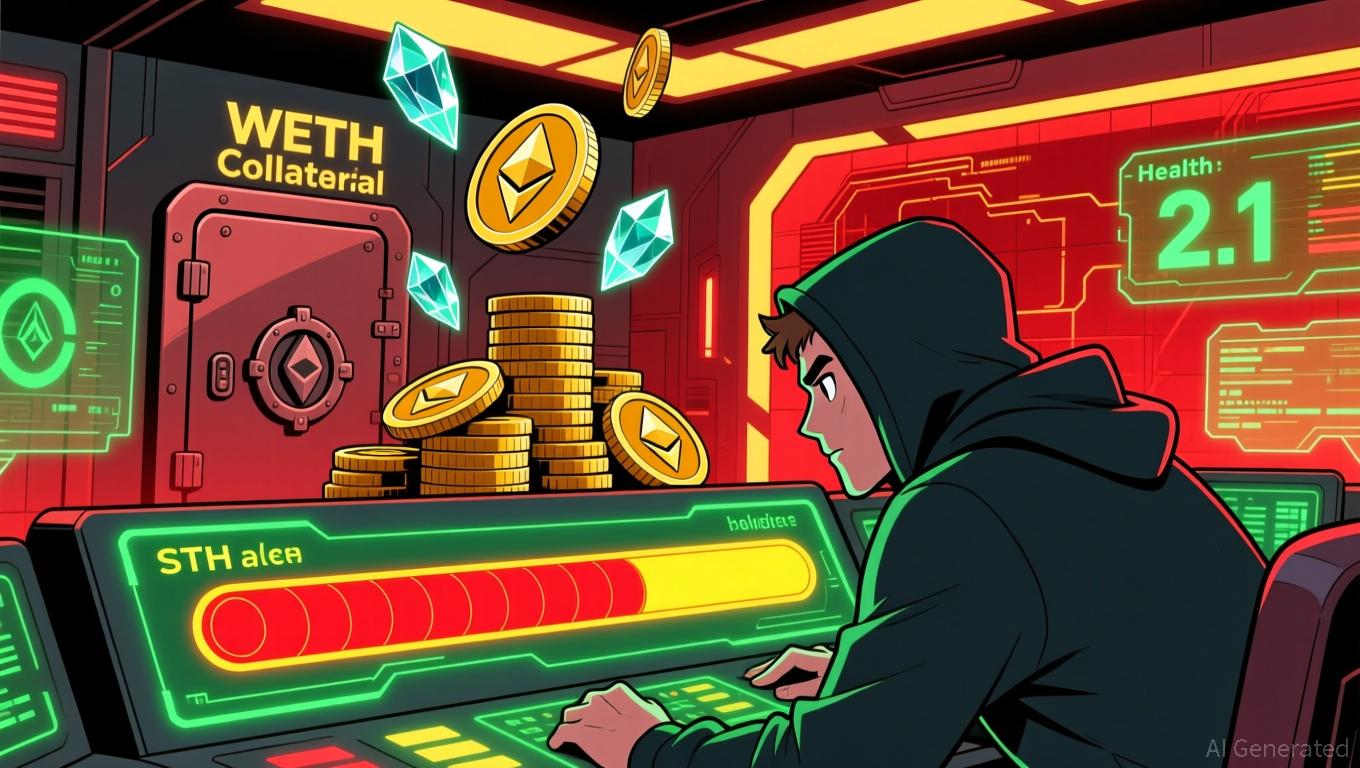Vitalik Buterin's Latest Advances in ZK Technology and Their Impact on the Market
- Vitalik Buterin's GKR protocol reduces ZK verification costs by 10-15x, enabling ZKsync to achieve 15,000 TPS with near-zero fees. - Ethereum's modexp precompile replacement addresses a 50x scalability bottleneck, aligning with its "Lean Ethereum" efficiency goals. - ZK-based platforms like ZKsync (ZKS +150% in 2025) attract Citibank/Deutsche Bank, while Starknet/Immutable expand ZK into DeFi and gaming. - Institutional adoption highlights ZK's viability for enterprise use, though quantum computing risks
A Major Step Forward: The GKR Protocol
The GKR protocol introduced by Vitalik is nothing short of revolutionary. It dramatically reduces verification expenses and hardware needs—by as much as 15 times in theory and 10 times in real-world scenarios. This leap is transforming
This progress isn’t just about speed. Lower computational requirements make ZK-powered networks more energy-efficient and, importantly, better protected against quantum threats, as mentioned in a

Addressing the Modexp Precompile and Ethereum’s Streamlined Vision
Vitalik’s efforts don’t end there. He’s also addressing a less obvious obstacle: the modexp precompile, a legacy component for RSA encryption that now slows ZK-EVM proofs by a factor of 50, according to the Bitget report. By substituting this with standard EVM code,
What does this mean? While some DeFi protocols may experience short-term fluctuations, the long-term outlook for the network is positive. It’s similar to a crucial “software update” for Ethereum’s infrastructure—one that could establish ZK-EVM as the benchmark for enterprise use.
Market Impact: ZKsync’s Growth and Institutional Interest
The results speak for themselves. ZKsync’s native token, ZKS, jumped 150% in November 2025 after the Atlas upgrade, which cut gas fees and drew in major institutions like Citibank and Deutsche Bank, as reported by Bitget. At the same time,
For those investing, the message is clear: ZK-based platforms have moved beyond speculation. They are addressing tangible issues—such as high transaction costs, slow processing, and regulatory challenges—and are attracting both retail and institutional capital.
Balancing Opportunity and Risk in the ZK Sector
However, every breakthrough comes with its own set of risks. Ethereum’s modexp challenge and the need for widespread GKR implementation point to ongoing technical obstacles, as the Bitget report notes. Regulatory concerns over privacy coins like
Still, these issues can be overcome. Investors should prioritize projects with practical applications and strong institutional support. ZKsync, Starknet, and Immutable are prime examples. For those with a higher risk appetite, investing in Ethereum itself—now a core platform for ZK innovation—may be a compelling option.
Final Thoughts: The Dawn of a New Blockchain Investment Era
Vitalik Buterin’s work with ZK technology represents more than just an upgrade—it marks a fundamental shift. As these solutions mature, we’re likely to see a split in the blockchain sector: older networks struggling to keep pace, while ZK-driven platforms lead in scalability and DeFi.
Right now, the takeaway is unmistakable: This is the moment to embrace ZK-based platforms. Whether through tokens like ZKS, Ethereum itself, or DeFi projects built on these foundations, the potential is enormous. But as always, proceed with care. The journey toward quantum-resistant, highly scalable blockchains is ongoing—and the most successful investors will be those who approach it with both foresight and caution.
Disclaimer: The content of this article solely reflects the author's opinion and does not represent the platform in any capacity. This article is not intended to serve as a reference for making investment decisions.
You may also like
Zcash (ZEC) Experiences Price Rally in Late 2025: Privacy-Focused Cryptocurrencies Return as Macro Safe-Haven Choices
- Zcash (ZEC) surged 750% in late 2025, outperforming Bitcoin and Ethereum amid growing demand for privacy-focused crypto assets. - Network upgrades by Electric Coin Company enhanced privacy via ephemeral addresses and zk-SNARKs, while Japan's crypto-friendly regulations boosted institutional adoption. - Institutional interest in Zcash's shielded transactions and low correlation with traditional crypto assets positions it as a strategic hedge against surveillance and volatility. - Regulatory clarity in Jap

Ethereum News Update: Major Ethereum Holders Invest $1.37B During Market Dip, Indicating Potential Rise to $10K
- Ethereum whales spent $1.37B buying 394,682 ETH during November 2025's 12% price drop, signaling strong bullish conviction. - Aave whale leveraged $270M loans to acquire 257,543 ETH ($896M), using a high-leverage borrowing-swapping cycle to expand holdings. - Institutional buyers like Bitmine Immersion added $139.6M ETH, joining coordinated accumulation as exchange reserves hit 2016 lows. - Market fundamentals show negative MVRV readings and $3,400 ETH stabilization, with analysts projecting $4,800–$10,0

UAE Executes Its Inaugural Digital Dirham Transaction: A Key Step Toward Shaping the Worldwide Digital Economy
- UAE executed first government transaction using Digital Dirham CBDC via mBridge platform in under two minutes. - The pilot involved Dubai Finance and Ministry of Finance, demonstrating blockchain-driven efficiency in public sector payments. - mBridge collaboration includes BIS, CBUAE, and regional partners, with Saudi Arabia joining in 2024 to expand cross-border capabilities. - UAE leaders called the initiative a "strategic pillar" for digital economy growth, aligning with global financial modernization

Visa’s Stablecoin Express Lane: Seamless, Real-Time Global Payments for Freelancers
- Visa launches stablecoin pilot for instant global payouts to gig workers, bypassing traditional banking infrastructure. - Program uses USD-backed stablecoins to address currency volatility and limited banking access in underbanked regions. - Initiative aligns with blockchain integration strategy, supported by regulatory clarity from the GENIUS Act and Visa's tokenized asset platform. - Pilot complements Visa's legal settlement negotiations with merchants and positions the company to maintain leadership i
